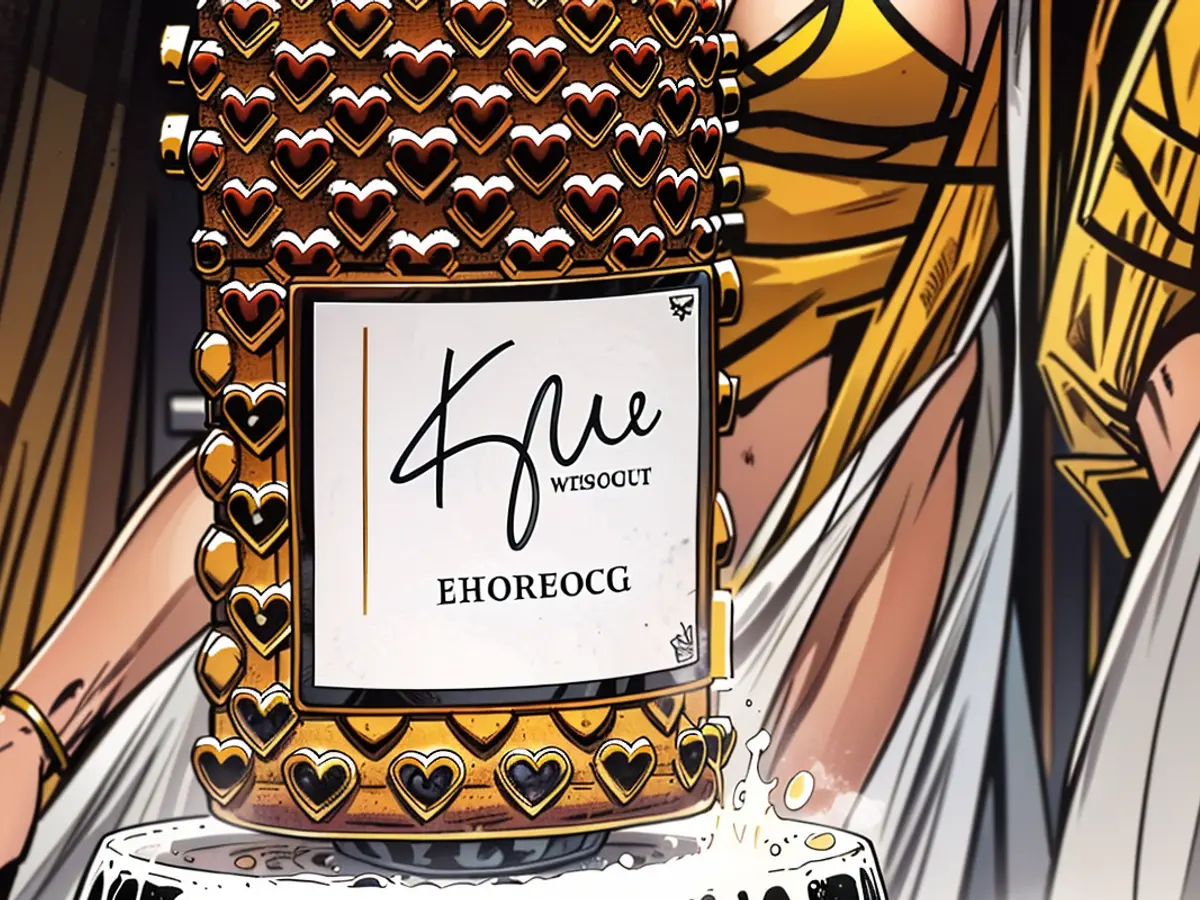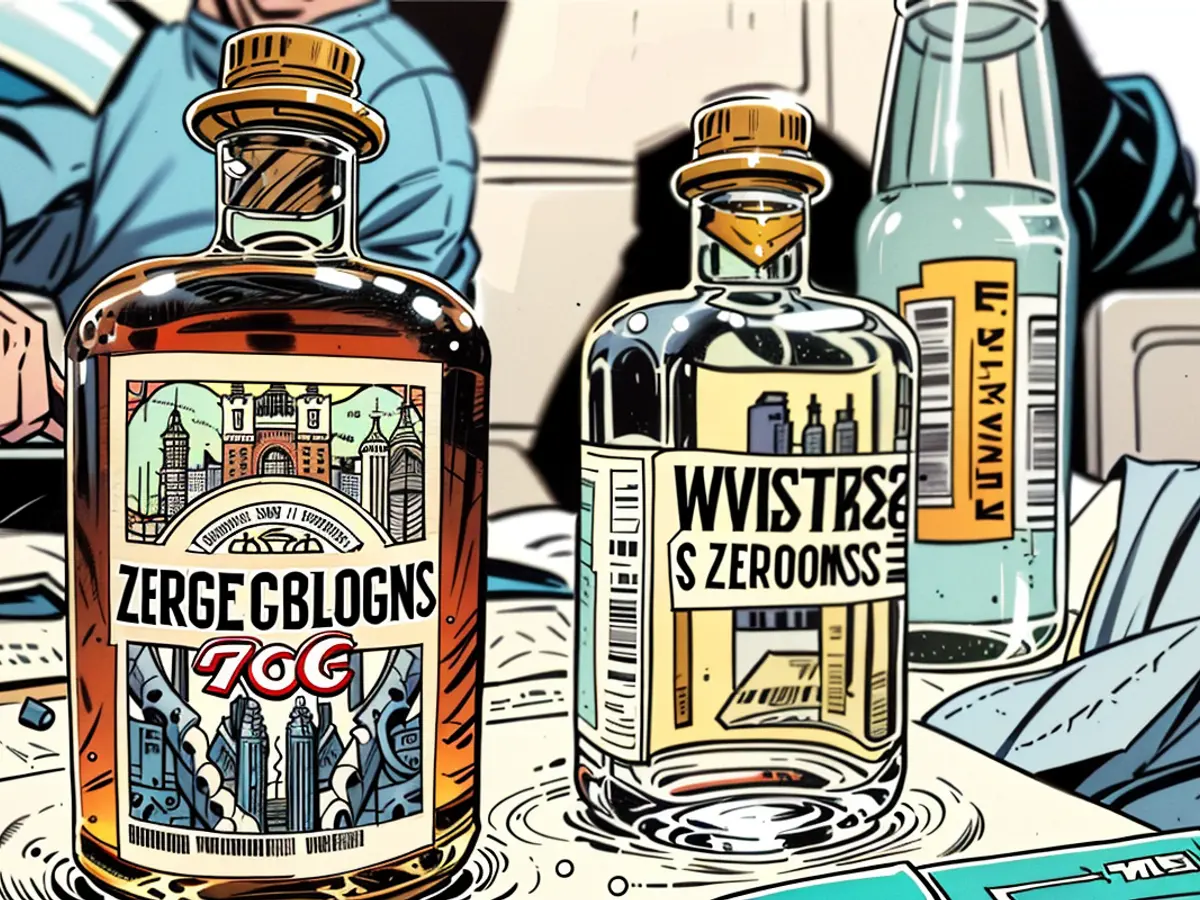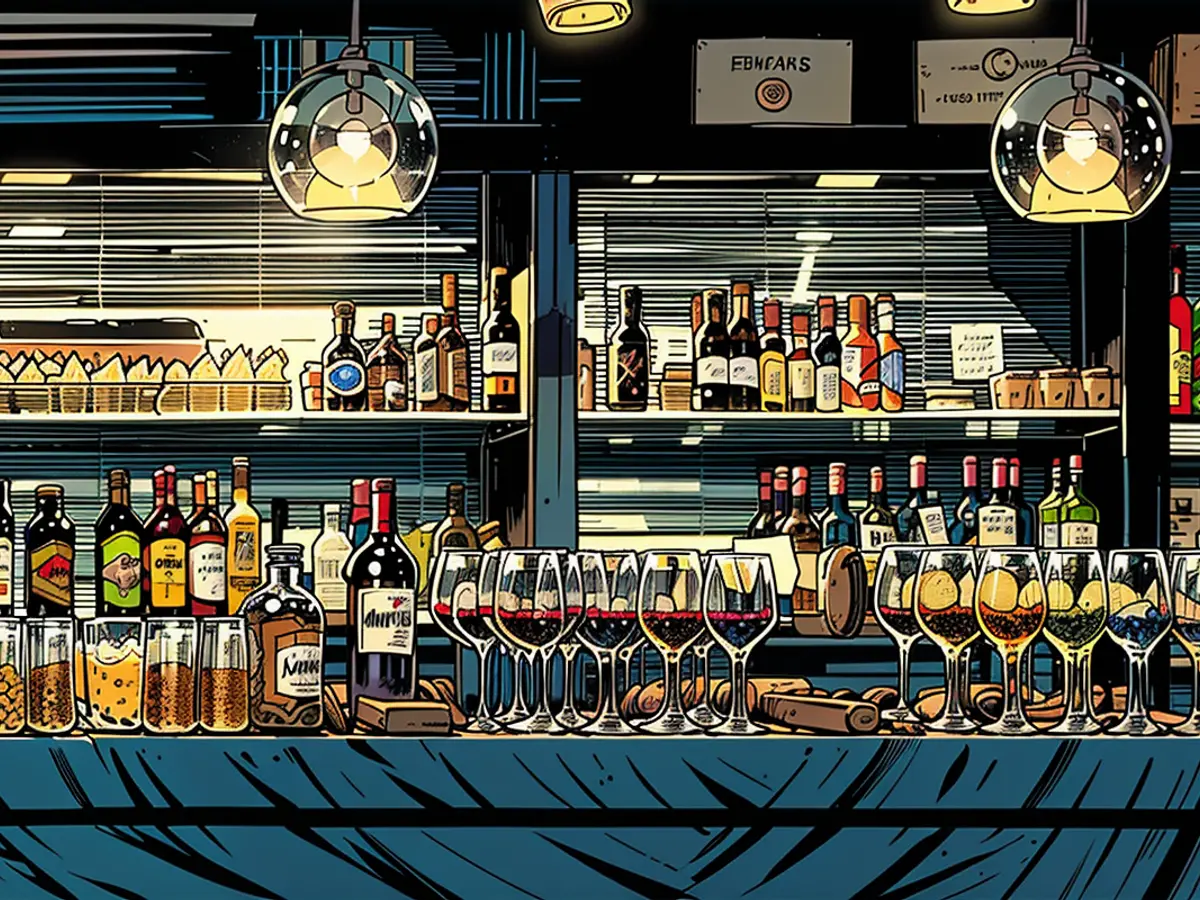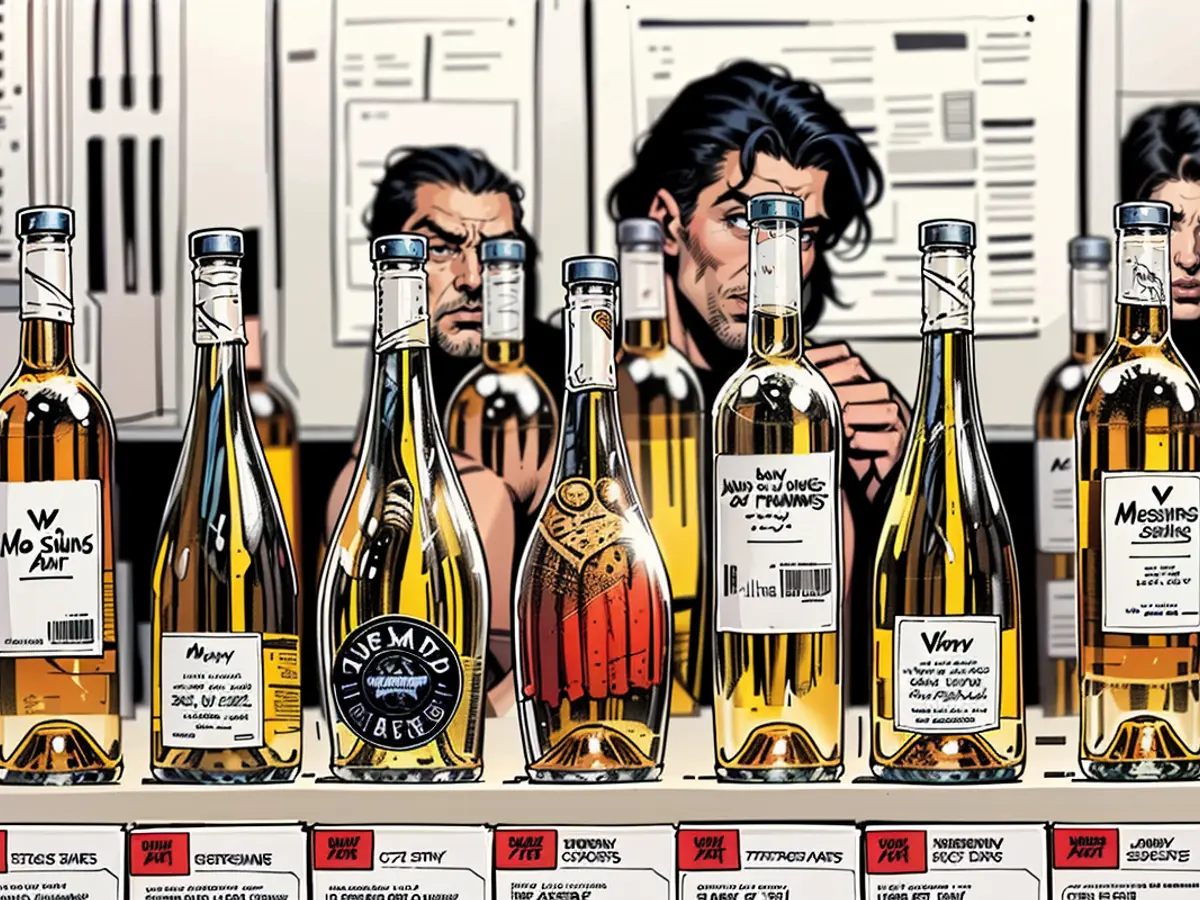Are there any delightful non-alcoholic wines that maintain their flavorful appeal?
In addressing the inquiry immediately: No, our writer has adhered to the trend and traversed the wine cellar. He arrives at an underwhelming result: This substance lacks flavor. However, with specific concoctions, one can still partake in a beverage during tea time.
The disheartening statistics present themselves clearly. Since the decline in beer drinking three decades ago, wine consumption has also dwindled in Germany, as reported by the German Wine Institute (DWI). An increasing number of individuals seek to reduce or eliminate alcohol consumption altogether for various reasons. As a result, retailers and restaurants are introducing an array of new beverages. The sales of non-alcoholic wines, popularly known as "de-alcoholized," have doubled in 2023 alone, according to DWI, and this trend is gaining traction, not just within the wine industry.
Lukas Kloskowski, a co-owner of "Viniculture" - often labeled as "Berlin's most daring wine shop," as per wine journalist Stuart Pigott - has noticed the swelling demand. He explains, "Low and no" refers to the collection of less boozy and alcohol-free beverages in present-day lingo. Although these drinks form a relatively small section in Viniculture, they claim a sizeable shelf space. Lukas shares that when the previous owner of the shop could no longer consume alcohol, they embarked on a quest to find the ultimate alternative.
Sourness, sweetness, and synthetic astringency
Discovering a palatable non-alcoholic beverage may seem daunting, as Kloskowski discovered after several weeks of diligent research. Although de-alcoholized wines are becoming more easily accessible, few can boast of pleasing taste. Kloskowski, who sampled around 20 different alternatives offered by various retailers - ranging from German, Spanish, French, and Italian origins - observed both variances and commonalties. While certain bottles, especially from Spain, boasted a fruity flavor, various bottles were dominated by vinegar, sugar, and synthetic astringency. Despite their attempts, customers were left with the taste of insipid juice or aged wine reminiscent of the lingering effects of a party, once the alcohol has evaporated.
Quince juice: A revolutionary change
However, some exceptional alternatives were found among the milk-secret offerings at Viniculture. A radical choice resulted in a remarkable discovery: a fantastic quince juice hailing from the Franconian Winery of Stefan Vetter. At €12 a pop, this alcohol-free delicacy delivers a symphony of fruit sugars, acids, and tannins - akin to a harmonious wine. Harnessing concentrated flavors, this juice dances delightfully on the tongue and palate, enveloping the mouth, and leaving behind a lingering aftertaste that stimulates the taste buds.

Equally fascinating were the varied creations of Peter van Nahmen's fruit cellar on the Lower Rhine, Jörg Geiger's fruit presses in the Swabian Alps, and Klaar Fruit Ferments on the Schaalsee.
Peter van Nahmen, renowned for his exquisite "single-varietal" juices, such as those derived from Riesling and Spätburgunder (Pinot Noir) grapes, is especially prized based on their enchanting sweetness - although an acquired taste. The less sweet wild plum juice from northern Italy, which costs approximately €8, is a delightful pairing for lamb, beef, wild game, and mushrooms. Van Nahmen is proud to share that, during a state banquet at Bellevue Palace, British monarch Charles III requested this wild plum juice to be served.
The blends crafted by Klaar Fruit Ferments also left a lasting impression. Klaar's "Proxy Rot," an alcohol-free alternative to red wine, emerges from a thoughtful mix of elderberries, elderflower, red beet, aronia, ginger, walnut leaves, apple stems, and quince peels. The velvety bitterness of Proxy Rot makes it an excellent food companion, comparable in price to high-end wines.
Indulging in a "Tea"?
Geiger's carbonated fruit juices are more affordable and boast complex flavor profiles due to their herbal and spicy components. For instance, Geiger recommends Prisecco Nr. 11 with unripe Boskop pear and oak leaves, or Aecht Bitter with green hunting pear and wormwood, as perfect aperitifs. To complement a meal, Geiger advises Prisecco Nr. 15 with red currants, raspberries, and gooseberries; Aecht Bitter with yarrow, rose hips, and elderflowers; and Cuvee Nr. 23 with cherries, apples, and elderberries.
Van Nahmen also creates sparkling fruit seccos, like those made from apples and quinces. They're more delightful to consume on the second or third day, once some of the carbonation has dissipated. However, this isn't the case for Peter van Nahmen's groundbreaking creation, the delectable, slightly sparkling JuicyTeas. These are three distinct blends, crafted from juices and tea infusions. Whether it's Darjeeling, rhubarb, and rose, jasmine, ironwort, and Riesling, or white tea, vanilla, and quince - the combination may seem like a wild liquid experiment, yet it's so well-balanced in taste that the journalist enjoys it in all its forms. The cost of approximately 9 euros is also noteworthy.

"Alcohol-free" isn't entirely devoid of alcohol
Rheinhessen winery St. Antony also concentrates on tea with its trend-oriented offshoot, Chato Zero. There, they bottle "Infiniteas" for approximately 10 euros per bottle: "The Duke of Blacktea" and "The Duchess of Rooibos". Both contain more than just tea - the subject of this article: dealcoholized wine! In both instances, it's sourced from Spain and produced from the white Chardonnay grape. These blends are pleasantly light, with a subtle wine aroma and fine acidity - and with a maximum alcohol content of 0.5% by volume, which equals four grams per liter. Although this is legally considered alcohol-free, the tiny amount serves the taste. Unlike the JuicyTeas, the Infiniteas have fewer fruit aromas, which makes them better suited for "food pairing".
For those seeking a similar option without carbonation, consider the 36° Grenache and 32° Riesling by Jörg Geiger, two distinct "silent dining companions" that cost around 16 euros each and are also made from dealcoholized wines. The Grenache grape is combined with plum juice and herbs, while the Riesling is mixed with apple juice and herbs. The residual alcohol content is no more than 0.3% by volume.
The most expensive wine alternative discovered by the journalist, Muri Drinks by Lukas Kloskowski, also has a low alcohol content. Exclusively available in Germany, Muri Drinks come in five carbonated varieties for 23 euros and one non-carbonated variety for 20 euros. Produced in Kopenhagen using kefir grains, they have a distinctive taste that doesn't align with typical flavor expectations and requires some courage to try. Despite their impressive marketing and stature in fine dining, they only fully reveal their aroma after being opened and aired for a day.
Dealcoholized wines are not the only response to the growing demand for less alcoholic beverages. However, they are not as pure or subject to stringent regulations as regular quality wines. The dealcoholization process, developed by Rheingau winemaker Carl Jung over a century ago, still has three fundamental drawbacks: it eliminates aromas, the alcohol that carries flavor, and replaces the loss with sugar. Moreover, all methods are labor-intensive, unsustainable, and expensive.
Six recommendations for those who still want to try:

- Germany: "Carl Jung" (white: Chardonnay, Riesling, or Cuvée; rosé: Grenache from Spain; red: Merlot, Cabernet, or Cuvée), around 6 euros.
- Germany: "Dr. Lo" by Dr. Loosen (white: Riesling), 9-10 euros
- Germany: "Fabelhaft drink & drive" (white: Riesling), 13-16 euros
- Spain: "Torres Natureo 0,0" (white: Muscat; rosé: Cabernet Sauvignon; red: Syrah), 8 to 10 euros
- Spain: "Torres Sangre de Toro" (white: Muscat; rosé: Cuvée of Syrah and Cabernet Sauvignon; red: Grenache and Syrah), 7 to 9 euros
- Italy: "Doppio Passo" (white: Muscat or Grillo; red: Cuvée), around 7 to 9 euros.
In response to the rise in demand for alcohol-free beverages, retailers and restaurants are introducing an array of new options. One such establishment, Viniculture, has noticed a significant increase in interest in "low and no" beverages. (Lifestyle change)
Contrary to popular belief, finding a palatable non-alcoholic beverage can be challenging. Despite the growing availability of de-alcoholized wines, many still lack flavor. However, exceptional alternatives, like quince juice, can provide a satisfying wine-like experience. (Lifestyle and preference for non-alcoholic beverages)






